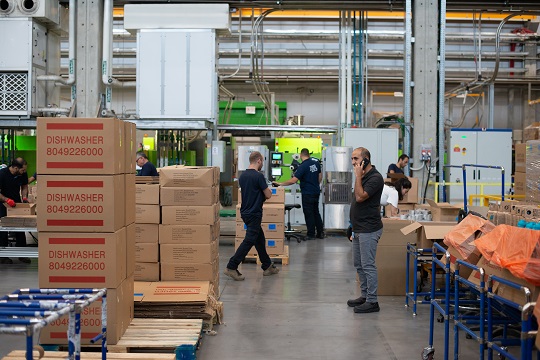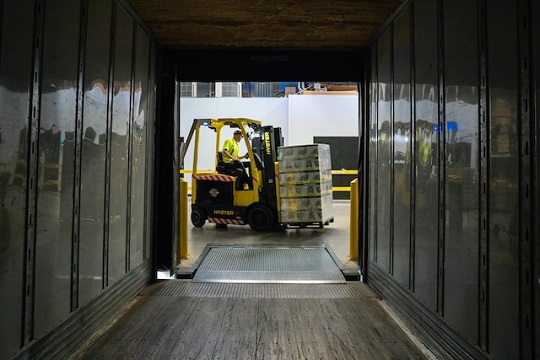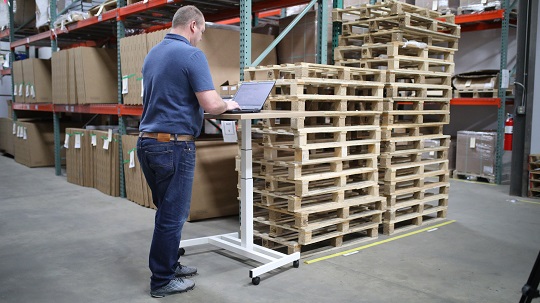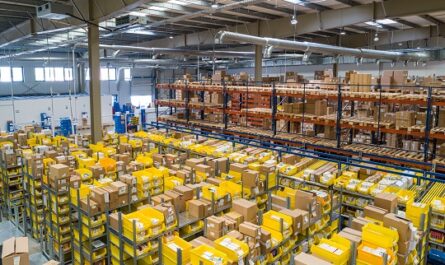In today’s supply chain world, warehouses are crucial for making sure products move smoothly from production to customers. Supervisors are like the key players, coordinating different parts of warehouse work to make sure everything runs well.
This blog post explores the top 10 important jobs supervisors have in warehouses, showing how they handle various responsibilities and affect the whole supply chain.
Before we go further into this topic, don’t forget to follow my LinkedIn account. You’ll get more helpful insights on supply chain management there.
Table of Contents
Leadership and Team Management
Being a supervisor in a warehouse involves leading and managing a team.
Supervisors are key in building and guiding a united group of warehouse staff. This involves everything from hiring the right people to ongoing training and motivation.
By creating a team-focused culture, supervisors make sure each team member works at their best, contributing to the overall efficiency of the warehouse.
Good communication and problem-solving skills are crucial for supervisors. They need to communicate expectations, give feedback, and share important information with the team.
Being skilled at resolving conflicts helps supervisors handle interpersonal challenges quickly, keeping a positive atmosphere that encourages productivity and collaboration among warehouse staff.
Ultimately, a supervisor’s success in leading and managing a team directly impacts how well the warehouse team works together.
Workflow Planning and Optimization
Supervisors play a crucial role in organizing and improving how things get done in a warehouse.
To do this well, they need to understand the entire process of the supply chain. They dive into the details of each step, from getting the goods to storing them and then distributing them.
It’s important for supervisors to also know what’s unique about the products in the warehouse.
With this overall understanding, supervisors can make smart plans to make workflows better, making each step work well with the bigger supply chain goals.

Supervisors plan strategically to make operations in the warehouse more efficient. They identify and solve potential problems that could slow down the movement of goods through the different stages of the warehouse process.
This proactive approach not only reduces delays but also makes the operation smoother and more flexible, so the warehouse can keep up with the changing needs of the market.
Basically, supervisors are like conductors, making sure the flow of goods in the warehouse works at its best, optimizing the whole process to be as efficient and responsive as possible to the broader supply chain.
Inventory Control and Accuracy
Keeping accurate records of inventory is crucial for effective warehouse management. It helps prevent problems like running out of stock or having too much inventory.
Supervisors are essential in making sure strong measures are in place to control inventory. This includes regularly counting and auditing stock and using advanced technologies like barcode systems.
These steps help supervisors make sure that the records of inventory match the actual stock, reducing the chances of mistakes that could disrupt the entire supply chain.
Supervisors overseeing inventory control do more than just ensure accuracy; they also play a vital role in predicting demand accurately.
By keeping precise and updated records of inventory, supervisors help the warehouse understand stock levels well, making it easier to anticipate changes in demand.
This proactive approach not only makes the warehouse more responsive but also prevents financial losses linked to inventory mistakes.
In the end, a supervisor’s dedication to strong inventory management protects the warehouse from disruptions and positions it to meet customer demands with accuracy and efficiency.
Safety Compliance and Workplace Regulations
Warehouse supervisors have a crucial role in making sure their team works in a safe environment. This means staying updated on the latest safety rules for warehouses and making sure everyone follows them.
Supervisors not only know about safety standards but also make sure they’re followed. They organize regular safety training to teach every team member the right procedures to avoid potential dangers in the warehouse.

Also, supervisors do thorough risk assessments to find and fix any safety issues, creating a workplace that cares about the well-being of its employees.
By focusing on safety, supervisors help prevent accidents and keep the warehouse team healthy. Prioritizing safety is not just a rule; it’s a promise to keep employees safe and secure.
Through proactive steps, supervisors reduce the chances of accidents or disruptions.
This commitment to safety not only improves the physical and mental health of the team but also establishes a culture of staying alert and being responsible in the warehouse, ensuring safety is always the top priority.
You might also like:
- Mastering Inventory Audits: A Comprehensive 10-Step Guide for Success
- Top 10 Key Considerations in Choosing Self-Managing Logistics or Using 3PL Services
Quality Assurance and Order Accuracy
A warehouse’s reputation is closely connected to how accurately and well it delivers orders to customers, and supervisors play a key role in maintaining these standards.
To make sure orders are fulfilled correctly, supervisors put in strict quality checks. They regularly inspect and audit the various stages of the process, from picking items to packing and shipping them.
By carefully looking at these steps, supervisors not only catch potential mistakes but also fix any issues, keeping up with high standards that directly affect the warehouse’s reputation.
Supervisors are crucial in ensuring customer satisfaction and loyalty. When they make sure orders are picked, packed, and shipped accurately, it creates a positive experience for customers.
Mistakes like sending the wrong items or causing delays can harm a warehouse’s reputation.
On the other hand, when supervisors prioritize accuracy and efficiency, customers get their orders on time, leading to satisfaction and trust.
This dedication to quality not only keeps customers loyal but also positions the warehouse as a reliable and trustworthy part of the larger supply chain.
Equipment Maintenance and Optimization
In a busy warehouse, making sure machines like forklifts and conveyor systems work smoothly is crucial for efficiency.
Warehouse supervisors take charge of keeping these essential tools well-maintained and optimized. They schedule regular checks to catch and fix potential issues early on.

Supervisors quickly deal with any breakdowns to minimize downtime and keep the warehouse running smoothly. They also explore ways to use new technology, like automation or upgraded equipment, to improve efficiency and meet the changing needs of the logistics industry.
Supervisors, by taking care of equipment maintenance and optimization, play a vital role in creating a warehouse that’s proactive and reliable.
By preventing breakdowns and embracing new technology, supervisors not only make the warehouse work better but also make the equipment last longer and be more cost-effective.
This proactive approach not only avoids disruptions but also positions the warehouse as a modern facility ready for the challenges of the ever-changing logistics world.
Ultimately, supervisors keeping a close eye on equipment is key to keeping the warehouse running smoothly and using advanced technology.
Performance Monitoring and Key Performance Indicators (KPIs)
Supervisors are responsible for keeping a close eye on how well the warehouse team is doing and monitoring key performance metrics. They use tools like key performance indicators (KPIs) to measure how efficiently different processes are running.
By using KPIs, supervisors get insights into important aspects of warehouse operations, helping them make smart decisions and keep making things better.
These indicators include important metrics like how long it takes to fulfill orders, how often inventory is turned over, and the rate of errors, giving a complete picture of how well the warehouse is doing.
Through careful analysis of KPIs, supervisors figure out where the warehouse can improve. Whether it’s making order processing faster, using resources better by optimizing inventory turnover, or putting in measures to reduce errors, supervisors actively work to make the overall operation better.
Using data-driven insights from KPIs, supervisors take specific actions to improve things, creating a culture of always getting better, which is crucial to stay competitive in the constantly changing world of supply chain management.
Communication and Coordination with Other Departments
Good communication is the key to a successful warehouse, and supervisors are vital in making sure everyone understands each other, both within the team and with other departments.
Working together with departments like procurement, transportation, and customer service is crucial for a smooth supply chain.

Supervisors make sure information flows smoothly across the organization, creating a well-coordinated team where everyone works together to reach common goals.
By keeping communication open, supervisors help everyone understand what the warehouse needs and can do, leading to better decisions and smoother operations.
In the complex world of logistics, making sure different departments work together is important for efficiency and meeting customer needs.
Warehouse supervisors act as messengers, sharing important information with other departments. This teamwork not only improves how the warehouse works but also helps the entire supply chain succeed.
By focusing on good communication, supervisors contribute to a well-organized structure where each department works together to make the supply chain better and meet customer expectations.
You might also like:
- Top 10 Warehouse Management Best Practices
- Top 10 Causes of Inventory Inaccuracies You Need to Be Careful Of
Continuous Training and Skill Development
In the ever-changing logistics industry, the skills of warehouse workers are super important for keeping everything running smoothly.
Warehouse supervisors play a key role by figuring out where there are gaps in the team’s skills and organizing training to fill those gaps. They look at what the industry needs and what the warehouse specifically requires to create training programs that fit.
This could include teaching about the latest technologies, making sure everyone knows safety rules, or introducing better ways of doing things.
Supervisors are crucial in making sure warehouse workers have the skills and knowledge to handle the challenges of the logistics sector.
Continuous training isn’t just about fixing immediate skill gaps; it’s an investment in making sure the workforce can adapt to future changes.
As the logistics industry keeps changing with new technology and market needs, it’s more important than ever for warehouse workers to be flexible.
By making ongoing training a priority, supervisors help create a workforce that can handle whatever comes its way, making operations more efficient.
This commitment to developing skills not only improves how the warehouse works but also makes the workforce a valuable asset that can drive innovation and stay ahead in a competitive market.
Problem Solving and Decision-Making
Running a warehouse is tricky, and supervisors are like expert problem solvers at the front lines. They need to be quick in dealing with unexpected issues that pop up, like delays in shipments, broken equipment, or mistakes in inventory.
Using their experience and smarts, supervisors figure out what’s causing the problems and find effective solutions on the spot.

Their ability to make quick decisions is super important for keeping the warehouse running smoothly and making sure disruptions don’t mess up the overall efficiency.
Supervisors don’t just focus on fixing immediate problems; they also work on making things better in the long run. They really understand how the warehouse works and use data to find and fix any bottlenecks.
This proactive approach doesn’t just prevent future issues; it also makes the warehouse more efficient and productive.
With their sharp thinking, deep knowledge of operations, and quick decision-making, supervisors play a big role in steering the warehouse through challenges and ensuring long-term success in the fast-paced world of logistics.
Conclusion
In the always-changing world of warehouse work, supervisors are like the foundation, guiding the way to make sure things run well.
They do a bunch of important jobs, from leading and managing teams to making sure everything works smoothly, keeping things safe, and always trying to make things better.
Understanding how vital their roles are is crucial for businesses that want to stay ahead in the fast-paced world of supply chain management.
As technology gets better and what the industry needs shifts, the job of warehouse supervisors will keep changing too, adjusting to new challenges and chances to make operations excellent.
I hope you find it helpful!
Please share this article with your colleagues so they can also benefit. For more insights on supply chain management, follow my LinkedIn account. You’re free to use all articles on this blog for any purpose, even for commercial use, without needing to give credit.
 by
by 

